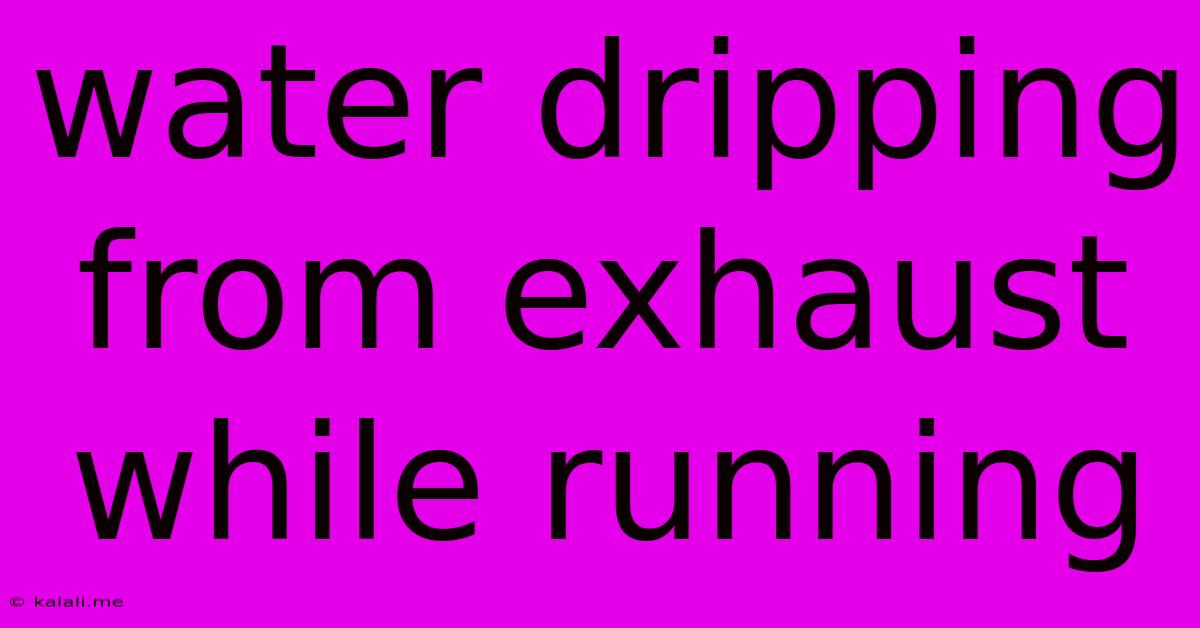Water Dripping From Exhaust While Running
Kalali
May 31, 2025 · 3 min read

Table of Contents
Water Dripping from Exhaust While Running: Is It Normal?
Seeing water dripping from your car's exhaust pipe while the engine is running can be concerning. Is this a sign of a serious problem, or is it perfectly normal? This article will explore the common causes of this phenomenon, helping you understand whether it's something to worry about and when you should seek professional help.
Understanding the Source: Combustion and Condensation
The primary reason for water dripping from your exhaust is condensation. Your car's engine burns fuel, and a byproduct of this combustion process is water vapor. This vapor, along with other exhaust gases, exits through the exhaust system. When these hot gases encounter the cooler outside air, they condense, forming water droplets that drip from the tailpipe. This is completely normal, especially in humid conditions or after a short drive.
Factors Affecting Water Dripping
Several factors can influence the amount of water dripping from your exhaust:
- Ambient Temperature and Humidity: Cooler temperatures and higher humidity levels increase condensation.
- Engine Temperature: A cold engine produces more condensation initially, as it takes time to reach its optimal operating temperature.
- Driving Conditions: Short trips often lead to more condensation because the engine doesn't reach its full operating temperature, while longer drives can result in less, as the system is hotter.
- Fuel Efficiency: A more fuel-efficient engine will produce less water vapor as a byproduct of combustion, leading to less condensation. Modern engines are generally more fuel-efficient and therefore produce less water.
- Type of Fuel: The type of fuel you use can slightly influence the amount of water produced during combustion.
When to Worry: Beyond Normal Condensation
While water dripping from the exhaust is often a normal occurrence, there are situations where it could signal a more serious problem. These include:
- Excessive Amount of Water: A significantly larger amount of water than usual could indicate a problem with your engine's cooling system. This could include a leak in the head gasket or a crack in the engine block, leading to coolant mixing with the exhaust gases.
- White Smoke Accompanying the Water: White smoke, particularly if it's thick and persistent, along with the water, could signal a blown head gasket or a cracked engine block, allowing coolant to enter the combustion chamber.
- Sweet Smell: A sweet, almost sugary smell alongside the water is a strong indicator of coolant leaking into the exhaust system, a serious problem requiring immediate attention.
- Other Unusual Symptoms: If the water dripping is accompanied by other problems like overheating, loss of power, or unusual engine noises, it’s crucial to get your vehicle inspected by a mechanic immediately. These are signs of more extensive engine issues.
Taking Action:
If you notice excessive water dripping, white smoke, a sweet smell, or any other unusual symptoms, don't hesitate to take your vehicle to a qualified mechanic for a thorough inspection. Ignoring these signs could lead to more significant and costly repairs.
Conclusion:
In most cases, water dripping from your car's exhaust is a perfectly normal process due to condensation. However, it's essential to be vigilant and aware of potential warning signs that could indicate a more serious underlying problem with your engine. By understanding the causes and recognizing unusual symptoms, you can ensure the longevity and reliability of your vehicle.
Latest Posts
Latest Posts
-
How To Make An Alarm On Continuous Month
Jun 02, 2025
-
Like The Stuff You Shouldnt Sweat
Jun 02, 2025
-
Sd Card Showing Up As Internal Drive Mac
Jun 02, 2025
-
Can You Own A Tow Truck For Personal Use
Jun 02, 2025
-
400 Amp Meter Base With 2 200 Amp Disconnects
Jun 02, 2025
Related Post
Thank you for visiting our website which covers about Water Dripping From Exhaust While Running . We hope the information provided has been useful to you. Feel free to contact us if you have any questions or need further assistance. See you next time and don't miss to bookmark.